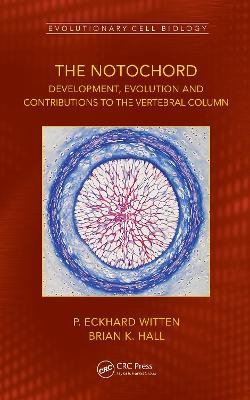
The Notochord
CRC Press (Verlag)
978-1-032-16268-3 (ISBN)
Although it is the defining organ of the Chordata, the notochord and its cells are one of the least understood vertebrate organs. This may be because large parts of the notochord are often replaced with cartilaginous or bony vertebral bodies. The presence of cartilage in the notochord raises questions about the evolutionary relationships between notochord cells and cartilage cells. This book integrates classical analytical studies with recent palaeontological, experimental, and molecular studies in both developmental and evolutionary contexts. For example, although the early signaling function of the notochord is conserved across the vertebrates, many will be surprised to find that the role of the notochord in vertebral body development in tetrapods is not the blueprint for all vertebrates. Recent studies on zebrafish and medaka embryos have uncovered the molecular mechanisms of a somite-independent notochord-driven segmentation process that establishes vertebral centra and intervertebral spaces. As this process is not restricted to teleosts, the authors have written a general discussion about the role of the notochord in vertebral formation. Modularity and segmentation of the vertebral column are related topics. Further overarching themes are the structure, function and fate of the notochord in adult vertebrates and notochord–cartilage relationships.
Key Features
The first book devoted to notochord development, function and evolution
Includes and integrates information on the notochord from studies going back 169 years
Integrates developmental, molecular, functional, experimental and palaeontological studies
Documents the fate of the notochord across the vertebrates
Extensively illustrated with classical and new images
Related Titles
Bard, J. Evolution: The Origins and Mechanisms of Diversity (ISNB 978-0-3673-5701-6)
Leys, S. and Hejnol. A. Origin and Evolution of Metazoan Cell Types (ISBN 978-1-1380-3269-9)
Paul Eckhard Witten (Dr rer nat), educated as a Zoologist at the Zoological Institute and Zoological Museum of the University of Hamburg (Germany) is a professor in the Department of Biology at Ghent University in Ghent (Belgium), where, together with Ann Huysseune, he co-supervises the Evolutionary Developmental Biology laboratory, which specializes in the development and evolution of skeletal tissues, ranging from the notochord to the vertebral column, dermal skeleton and dentition. His research focuses on development, plasticity, and remodeling of skeletal tissues, especially bone, cartilage and teeth of teleost fish. Co-founder of the European Society for Evolutionary Developmental Biology, he is the founder and organizer of the international conference series on Interdisciplinary Approaches in Fish Skeletal Biology (IAFSB.org). Brian Keith Hall (PhD, DSc, LLD (hc), FRSC), educated as an experimental embryologist and zoologist at the University of New England in Armidale (Australia) is University Research Professor Emeritus at Dalhousie University in Halifax (Canada). His research on the differentiation of skeletal tissues led him to earlier stages of embryonic development and the origin, function and evolution of skeletogenic neural crest cells through comparative studies using embryos from all five classes of vertebrates. A Fellow of the Royal Society of Canada, Foreign Fellow of the American Academy of Arts and Science, recipient of a Killam Prize from the Canada Council for the Arts, he was one of eight individuals awarded the first Kovalevsky Medals in 2001 to recognize distinguished scientists of the 20th century in comparative zoology and evolutionary embryology.
Ch1 - Introduction to the Notochord and to Notochord Cells
Ch2 - Discovery and Evolutionary Origin of the Notochord
Ch3 - Germ-layer Origin of the Notochord: Endoderm or Mesoderm
Ch4 - Function of the Notochord in Early Embryonic Development
Ch5 - Notochord Cells and Notochord Sheath Formation
Ch6 - The Role of the Notochord in Vertebral Body Development
Ch7 - The Notochord in Adult Vertebrates
Ch8 - Relationships between Notochord and Chondrogenic Cells and Tissues: Transformational Series
Ch9 -The Notochord and Hypotheses about the Evolution of the Vertebral Column
References
| Erscheinungsdatum | 04.01.2022 |
|---|---|
| Reihe/Serie | Evolutionary Cell Biology |
| Zusatzinfo | 4 Tables, black and white; 15 Line drawings, color; 14 Line drawings, black and white; 19 Halftones, color; 5 Halftones, black and white; 34 Illustrations, color; 19 Illustrations, black and white |
| Verlagsort | London |
| Sprache | englisch |
| Maße | 156 x 234 mm |
| Gewicht | 453 g |
| Themenwelt | Sachbuch/Ratgeber ► Natur / Technik ► Natur / Ökologie |
| Naturwissenschaften ► Biologie ► Evolution | |
| Naturwissenschaften ► Biologie ► Zellbiologie | |
| Naturwissenschaften ► Biologie ► Zoologie | |
| Weitere Fachgebiete ► Land- / Forstwirtschaft / Fischerei | |
| ISBN-10 | 1-032-16268-6 / 1032162686 |
| ISBN-13 | 978-1-032-16268-3 / 9781032162683 |
| Zustand | Neuware |
| Informationen gemäß Produktsicherheitsverordnung (GPSR) | |
| Haben Sie eine Frage zum Produkt? |
aus dem Bereich


